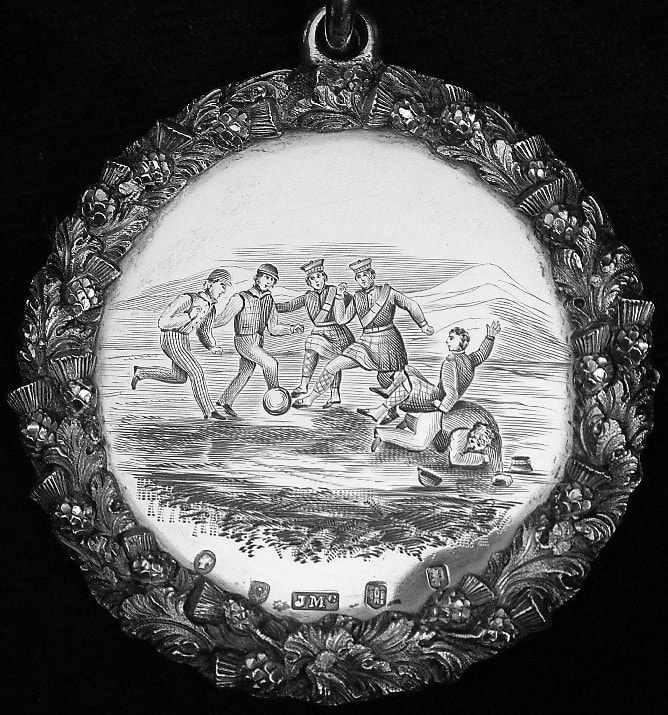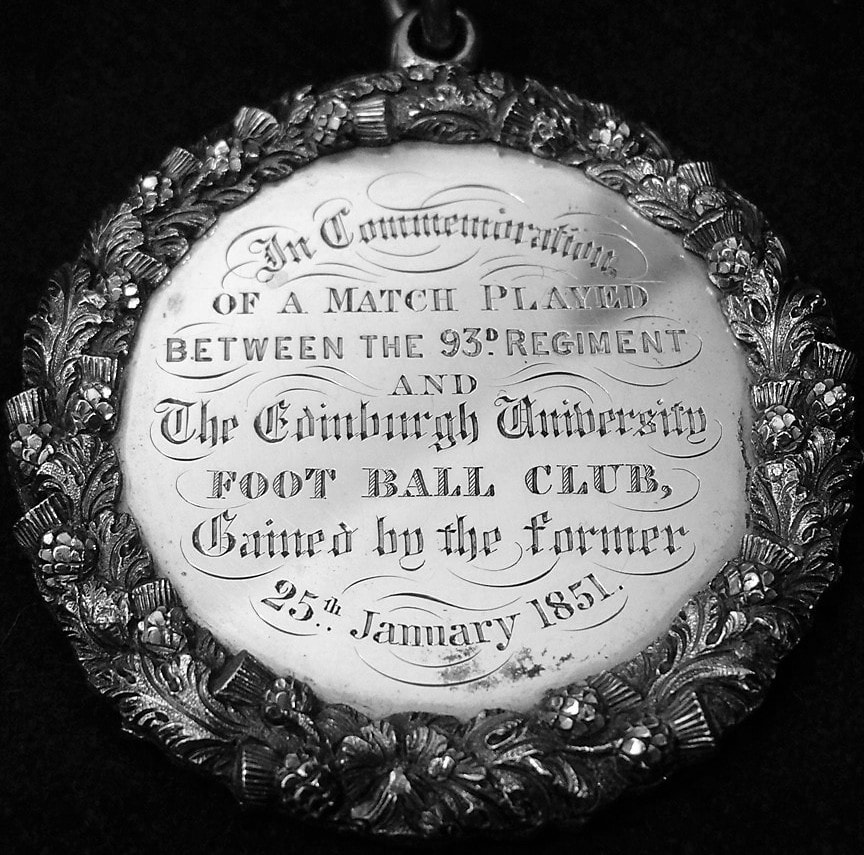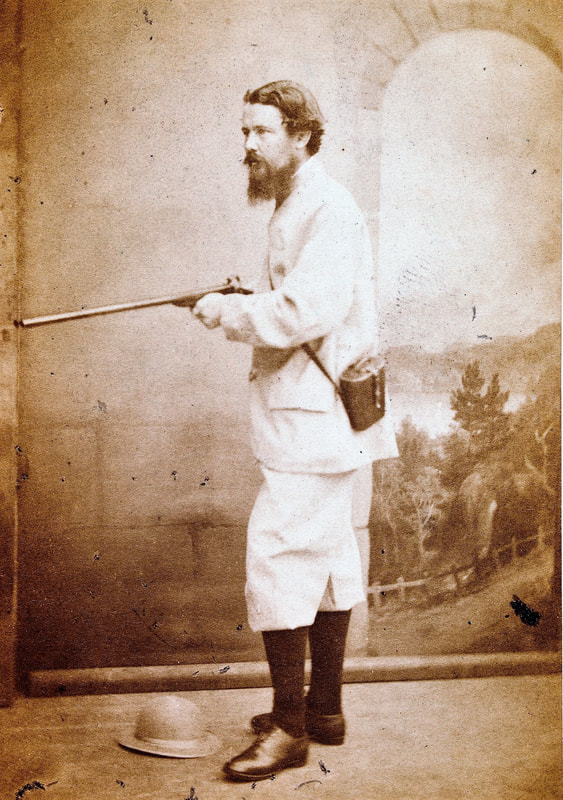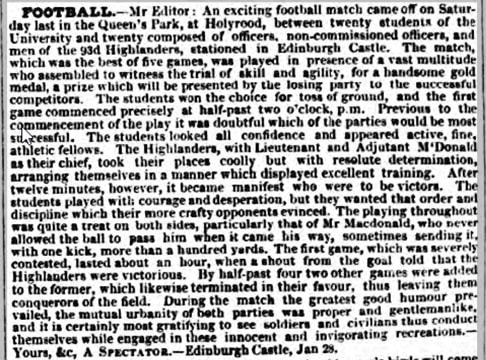Engraved with a detailed action scene of soldiers in kilts challenging for a ball against students in ordinary outdoor clothes, on the other side it has the match details. This silver medal provides an indisputable record of a competitive game of football taking place, and is of exceptional historical value as the sport's first trophy, in the sense that it was a prize for the winners.
The first of these related to a momentous game played on 25 January 1851 'in presence of a vast multitude' in the Queen’s Park (next to Holyrood Palace). It was contested 20-a-side between the Edinburgh University Foot Ball Club and the 93rd Regiment of Foot (later to become the Argyll and Sutherland Highlanders), who were garrisoned at Edinburgh Castle. The reporter gushed: 'The students looked all confidence and appeared active, fine, athletic fellows. The Highlanders took their places coolly but with resolute determination, arranging themselves in a manner which displayed excellent training.'
The teams kicked off at half past two for the best of five games (goals), with ends changed each time a goal was scored, and two hours later the soldiers were declared the winners by a convincing 3-0 margin.
What made this contest particularly noteworthy is that the teams had agreed beforehand that the losers would present the winners with a medal – originally meant to be gold, but in the event only silver. It was commissioned from the silversmith James Mackay, whose son Robert had been a member of John Hope's Foot-Ball Club from 1824-26; he may have been able to advise his father on the design. This priceless object is now on display in the Argyll and Sutherland Highlanders' regimental museum in Stirling Castle.
The soldiers were no strangers to football. The previous month they had played a match at Spark's Cricket Ground in Grove Crescent, reported in the press, and that helped to provide clues to the identity of the winning captain. He was Lieutenant William Donald Macdonald, born in 1827 in Strathmartine, Angus and who joined the regiment in 1847 as Ensign. He had a much-decorated military career in the Crimea, China and the Indian Mutiny, rising to the rank of Lieutenant Colonel before he died of cholera in India in 1862.
While the medal match was important, the students were not done yet. A month later Bell's Life published a report headed 'University of Edinburgh Foot Ball Club’' of a 24-a-side match between 'the Scotch and English members composing this club'. I believe this is the first known example of a football match of any kind being played according to nationality.
The game started at two, the teams identified 'on the Scotch side by a green badge, and on the English by a red', and it was agreed that they would play for three hours. The Scots scored first with 'a lucky hit', then the English scored twice and were declared winners when five o'clock struck. The writer counted 500 spectators, named seven players from each side and two umpires, and gave us one of the most complete football reports of its day.
Although the participants were identified only by their surnames, it is possible to work out who some of them were. The English (Russell, Broadbent, Cobbold, Aldridge, Frost, Jones and Cousens) all appear to have been medical students, including William Henry Broadbent (1829-61) of Cheshire, Thomas Spencer Cobbold (1828-86) of Ipswich, and one of two Aldridge brothers from Hampshire.
The Scots (Nasmyth, Smyth, Currie, Frazer, Dickson, Bone and Christison) also featured future doctors such as John Barclay Nasmyth (1832-55) and David Christison (1830-1912), both of Edinburgh, and one of three Bone brothers from Barbados. The team also included James Currie (1828-86), a Divinity student, and Archibald Dickson (1829-95) of Hawick who was studying Law. The two umpires were probably Robert Paterson, a Law student from Ayrshire, and James Hood Wilson, later a Free Church minister.
The final report in Bell's Life that spring was of a match played on Leith Links on 21 March 1851, between 'the members of the Edinburgh University club and the gentlemen attending the Veterinary College'. It was won 2-0 by the former after two hours, and the writer noted that 'the arrangement of the forces from the University was decidedly superior, and throughout their play was of a much higher order. This is mainly attributable to the good practice the side has been in since the commencement of their season.'
He makes reference to a proposed match between the Universities of Edinburgh and Glasgow, 'the first time the rival clubs have competed together', but unfortunately no report of this match has been found, if indeed it took place.
Thanks to these anonymous articles in 1851, we know that Edinburgh University Football Club was organised, practised regularly and had a programme of fixtures. The soldiers of the 93rd also clearly enjoyed their sport and even after they left Edinburgh for a posting at Weedon Barracks in Northamptonshire they held Highland Games which concluded with a game of football.
Although there are no further accounts of the Edinburgh students playing football until the end of the decade, that may simply be due to a lack of newspaper coverage. The clear inference from all of this, notably the presentation of the first medal and the number of detailed reports, is that football was played more widely in the 1850s than is generally believed. Long before it was codified into the modern game, football was a popular pastime in Edinburgh.
- Several schools held house championships, such as Rugby from 1850 and Harrow in 1853 but they did not award a trophy in the early years. Eton instituted their House Football Cup in 1860, while at Uppingham the Champion House Football Cup was inaugurated in 1864
- The first adult football club to award a silver cup was Sheffield FC, presented to William Prest in 1858 for winning the 100 yards sprint.
- The earliest adult football knock-out trophy was the Youdan Cup, competed for by Sheffield clubs in 1867.
- The oldest association football competition is the FA Cup, started in 1871/72, and the oldest surviving trophy is the Scottish FA Cup of 1874.




 RSS Feed
RSS Feed